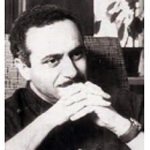Alfred Sarant

Electrical engineer
Born: New York - 1918
Died: Leningrad - 6 March 1982
An American-born Communist who was part of the Rosenberg spy ring, Alfred Sarant fled to the USSR in 1950 and, under the name Filipp Staros, became one of the Soviet Union's leading electrical engineers, responsible for numerous innovations in computing and microelectronics.
Born in New York to a family of Greek immigrants, Sarant received a B.S. in electrical engineering from Cooper Union College in 1941 and worked during the war on military communications systems and in the nuclear physics laboratory at Cornell University. He was a member of the American Communist Party until 1944. At some point before or during the war, Sarant was recruited by his roommate, Joel Barr, into the Rosenberg spy ring, and the two passed thousands of pages of information concerning US weapons programs, especially radar, over to the Soviet authorities.
When Julius Rosenberg was arrested in July 1952, Sarant was questioned by the FBI but released without charge. Three days later, he fled the United States with his neighbour Carol Dayton. Both left children and spouses behind. The couple traveled through Mexico, Guatemala, Morocco, Spain and Poland to Moscow, where Sarant was reunited with Joel Barr, who had escaped to Czechoslovakia earlier in the year. Joel Barr became Iosif Berg, and Alfred Sarant took the name Filipp Staros, claiming to be a Greek citizen educated at the University of Toronto. The three Americans were first sent to Prague, and then in 1956 arrived in Leningrad, where they were put in charge of a secret military electronics research institute, originally located in the House of Soviets.
Sarant proved to be not only a talented scientist, but also an excellent organizer. He and his team almost single-handedly established microelectronics in the USSR, creating early small computers that could be fitted on planes and submarines. In the mid-1960s, Sarant's Design Bureau had over 800 employees, and he enjoyed the personal support of Nikita Khruschev, whom he persuaded to allow him to establish a town-size research centre near Moscow, Zelenograd, that would become the "Soviet Silicon Valley". He was made a Doctor of Technical Sciences (the highest title among Russian scientists) in 1967, and in 1969 he was awarded the prestigious State Prize of the USSR.
After the death of Khruschev, however, Sarant found his position compromised by those in the scientific hierarchy who resented the freedom he enjoyed. His meritocratic policy of employing talented non-Party members and Jews was also frowned upon. He hoped to revive his career by moving across the country to Vladivostok, away from personal rivalries in the Leningrad authorities, to take charge of a new artificial intelligence research unit. However, he was continually thwarted by the strictures of the Soviet system, and spent most of his energy teaching at the Far-East University, where he established an English Yacht Club and an English Music Club (where he played guitar and banjo, and translated Beatles and Rolling Stones songs for his students). He died in Moscow in 1979, and his ashes were buried at the Bolsheokhtinsky Cemetery in Leningrad.
Sarant and Berg's last major design, the Uzel fire-control system, the first digital computer on a Soviet submarine, is still in use today on Project 877 and Project 636 (NATO reporting name "Kilo class") submarines manufactured in St. Petersburg and used by the Chinese, Indian, Polish and Algerian Navies.
Connected with: Joel Barr (Iosef Berg)

